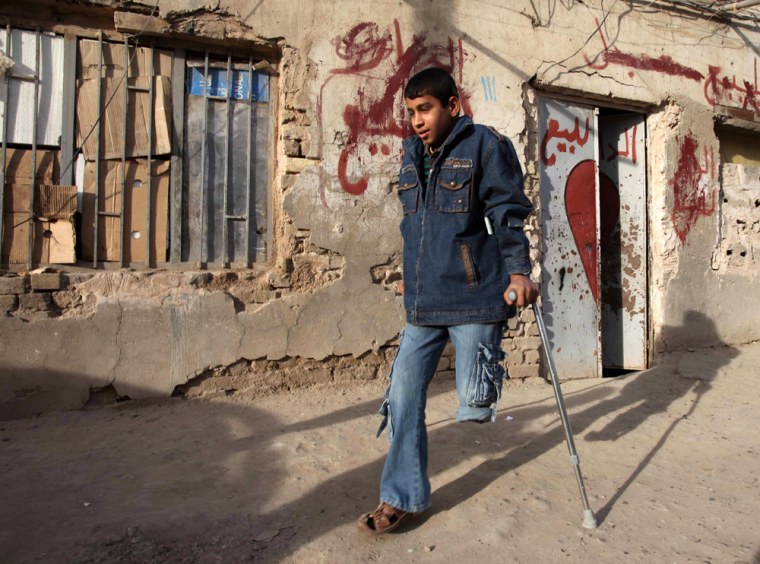Until age 8, the boy was a top scorer in soccer games in the alleys of his Baghdad neighborhood. Then a mortar blew his lower leg off. More than four years later, he is still waiting for an artificial limb.
In the meantime, he plays goalie. It doesn't require too much running. "The other kids also let me use my crutches to block the ball," said Mohamed al-Bazouni, a smile flashing across his otherwise solemn face.
Now, with Iraq's violence down from its mid-decade peaks, the medical system is finally finding the breathing room to gear up for rebuilding the bodies maimed by war. But thousands who lost limbs still face long waits. Materials for prostheses are scarce, as are experts in rehabilitating the injured.
"We don't have enough resin, we don't have enough fake joints and we don't have enough technicians," said Dr. Thamir Aziz, who helps oversee the production of artificial limbs at Baghdad's Medical Rehabilitation Center, the biggest center for prosthetics and one of 18 around Iraq.
Metal leg supports have just arrived after a two-year wait, he said. "It's hardest on the children. They need small feet or hands and special joints."
Still, there are reasons for hope. The reduced violence has freed up medical staff who were long focused on simply saving lives, and renovations are nearly complete at the Baghdad center, which was heavily damaged by looters after of the 2003 ouster of Saddam Hussein.
Last year, even before the repairs were complete, the center increased its caseload, giving limbs to 685 of the 750 patients who needed them.
'We need more doctors'
Hundreds of thousands of Iraqis were wounded in the U.S.-led invasion and the insurgency that followed, at least 60,000 of them since April 2005, by Associated Press count, and many of them lost limbs. The roads to the orthopedic centers were too dangerous for travel, and many medical professionals fled Iraq. The Health Ministry says Iraq needs 6,000 physiotherapists but fewer than 1,000 have remained.
The number of limb-makers is down by half, and of rehabilitation physicians by a third.
"We need more doctors, nurses, physiotherapists, occupational therapists, speech therapists, any kind of therapist," said Dr. Chasib Ali, who heads the ministry department responsible for rehabilitating the injured. "And we need more raw materials for treatment. All types."
After the Iran-Iraq war of the 1980s the International Committee of the Red Cross became a key provider of limbs. Iraq was one of the largest recipients, along with Cambodia and Afghanistan.
But the Red Cross had to halt its help because of the invasion, and its return has been gradual. In 2008, the last year of statistics available, 1,800 patients received Red Cross prostheses, compared with some 3,000 a year during the 1990s.
Foreign charities also stepped in. A Rotary International project based in Maryland collects discarded limbs from Americans to be stripped down for spare parts and shipped to Iraq. Project chairwoman Linda Smythe said three shipping containers of parts have been sent to a clinic the group supports in the southern port city of Basra.
The looters who trashed the Baghdad rehabilitation center even ripped out windows and doors. Now new exercise equipment and examining beds have been delivered, paid for by Iraq's Health Ministry.
Besides making limbs, the center provides physical therapy, massage and other treatments and handles about 500 appointments a day.
'Nobody cared'
But it has only eight doctors where there used to be 20, and the obstacles patients face are formidable. Many living out of town are too poor to afford the journey and have nowhere to stay overnight when undergoing a regimen of physiotherapy.
Those with money can go private, but a limb will cost them around $1,000, compared with $10 at the Baghdad center.
Because of poor coordination among hospitals, many don't even know where to look for help. Ahmed al-Bazouny, father of soccer-loving Mohamed, only heard of the center right in his own city after three frustrating years of going around health facilities and charities begging for help for his son, who was chronically in pain.
At the height of the violence, no one had time to listen. The hospitals were bloody assembly lines, patching up and pitching out patients as fast as possible to make room for new casualties.
"Nobody cared," the 33-year-old farmer said, his hand resting protectively on his son's knee.
Finally, after seven months of waiting, doctors at Baghdad's al-Wasiti Hospital operated on Mohamed's below-the-knee stump and his other leg to straighten them. For the next seven months, Ahmed went to the hospital every week for therapy, often encountering shootings and explosions.
He and his father never missed an appointment. When bomb blasts stopped their bus from reaching the hospital, Ahmed got out and carried his son in his arms.
"I saw a man go past us in the back of a pickup truck. He was covered in blood and it made me think of when I got hurt," said Mohamed quietly. "I looked away and I recited verses from the Quran ... Sometimes the image comes to me at night and makes me afraid."
Mohamed, a slender, dark-eyed boy, is full of plans for when he finally gets his leg. He dreams of going to teachers' college and of once again being the terror of the rival football team.
"Insh'allah," said his father, patting his son. God willing.
